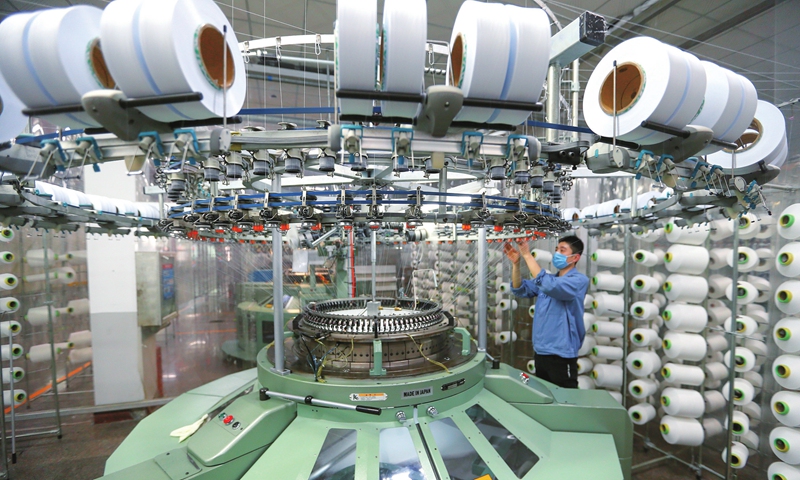
An employee rushes to finish orders at a knitwear factory in Jimo district, Qingdao in East China's Shandong Province on January 5, 2022. Textile firms in the district, traditionally known for its strength in the clothing industry, are seeing booms in production and sales. Photo: cnsphoto
As the Omicron variant spread to several Chinese cities ahead of the Chinese New Year, factories in many places across the country are making contingency plans, including ramping up production ahead of the holidays, encouraging non-local employees to stay put and adjusting their supply chains, to ensure that their production won't take a hit in the coming weeks.
During the Chinese New Year, many factory workers would go home to spend the holidays with their families, raising concerns about the resumption of work after the holidays due to anti-epidemic restrictions. However, with precautionary measures and adjustments, most factories said that they are not too concerned about problems for their operations such as a shortage of labor after the holidays.
"We have too many orders approaching the Spring Festival, which gives us no choice but to hurry up and stock up products now," said Zhao Cheng, owner of a Jiangsu-based auto parts factory that supplies a German car factory. Normally, the workers would have all gone home for the holidays by this time, but this year they are staying put to complete the orders, Zhao said.
The company also made contingency plans after last year's experience, such as increasing the proportion of local employees in the total staff, in case pandemic-linked logistics hurdles cause a sudden impact on production.
Zhejiang Yueyun Piano Co, a piano manufacturer based in Deqing, East China's Zhejiang Province, is responding to local government policies by encouraging non-local employees to spend their Spring Festival in Deqing. The company has decided to give a "benefit package" that includes food and daily articles to staff members who are willing to stay, Jin Yicheng, head of the company, told the Global Times.
"We're increasing our inventories in accordance with the 2022 production plans, and making plans to cope with possible 'special circumstances' arising from coronavirus uncertainties, such as work resumption difficulties," Jin said.
Such contingency plans come as many parts of the country are fighting to contain the COVID-19, as the Omicron variant spread to several Chinese cities. That has prompted some foreign media outlets to paint a dire picture for China's economic activities.
However, in interviews with the Global Times, factories in many of the virus-hit places are not seeing major disruptions to their production.
For example, in Xi'an where strict measures are still in force, many large car companies have adjusted their supply chains since last year and have not suspended production, an industry insider told the Global Times, noting that many companies had made arrangements for certain employees to continue work even during strict lockdowns.
A staffer at the investor hotline of Zhuhai Hokai Medical Instruments Co also said on Monday that the company's main factory in Zhongshan is operating normally at present, though some workers had to work from home due to anti-epidemic restrictions.
In general, the companies contacted by the Global Times said they are not too worried about possible trouble caused by the coronavirus during or after the holidays.
"Our employee flow is relatively stable, and the proportion of non-local employees is small, so we don't have too many worries about labor shortages after the Spring Festival holidays," Jin said.
Tian Yun, former vice director of the Beijing Economic Operation Association, said that as local governments and companies beef up efforts to "grab" laborers, there won't be disruptions due to labor shortage issues.
According to Tian, based on his surveys recently, many companies are thinking of using automation to replace factory workers. They are also cautious about expanding production lines, but are instead thinking of raising product prices in the face of external challenges, he said.




